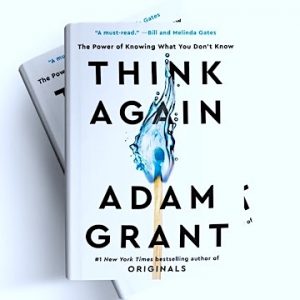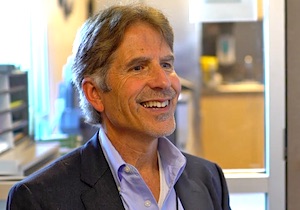 By Cathy Gassenheimer
By Cathy Gassenheimer
Executive Vice President
Alabama Best Practices Center
When people reflect on what it takes to be mentally fit, the first idea that comes to mind is usually intelligence. The smarter you are, the more complex the problems you can solve—and the faster you can solve them. Intelligence is traditionally viewed as the ability to think and learn. Yet in a turbulent world, there’s another set of cognitive skills that might matter more: the ability to rethink and unlearn.
 Adam Grant, the creator of the sentences listed above, certainly nails our current situation. The Covid pandemic has forced many of us to rethink and unlearn many of the things we did and believed in before Covid. Yet, lest you or I become smug about the progress made, we need to Think Again, which is the title of his new book, subtitled The Power of Knowing What You Don’t Know.
Adam Grant, the creator of the sentences listed above, certainly nails our current situation. The Covid pandemic has forced many of us to rethink and unlearn many of the things we did and believed in before Covid. Yet, lest you or I become smug about the progress made, we need to Think Again, which is the title of his new book, subtitled The Power of Knowing What You Don’t Know.
Grant is an organizational psychologist at The Wharton School (University of Pennsylvania). He is also a founder and curator of the Next Big Idea Club a nonfiction book resource that I’ve loved for several years now. Grant, along with Daniel Pink, Malcolm Gladwell, and Susan Cain, select two notable books each quarter to send to members. It is through my membership in the Next Big Idea Club that I discovered the brilliance of Adam Grant and received his Think Again book.
Thinking Like a Scientist – Not a Preacher, Prosecutor or Politician
Early in the book, Grant calls upon the insights of a colleague named Phil Tetlock. Tetlock suggests our thoughts and conversations usually put us into one of three categories or professions: a preacher, a prosecutor, or a politician.
“We get into the preacher mode when our sacred beliefs are in jeopardy: we deliver sermons to protect and promote our ideas. We enter prosecutor mode when we recognize flaws in other people’s reasoning: we marshal arguments to prove them wrong and win our case. We shift into politician mode when we’re seeking to win over an audience: we campaign and lobby for the approval of our constituents” (p. 18-19).
And, when we step into those roles, we abrogate the opportunity to pause, reflect, and possibly rethink those very views we advocate.
Instead, Dr. Grant invites us to think and act like a scientist. Scientists live in a world full of hypothesis. Their experiments, whether resulting in what they predicted are not, provide additional knowledge and moves scientific researchers closer to deep understanding of whatever they are studying.
Today, more than ever as we approach a post-Covid world, we need to act more like scientists and less like preachers, prosecutors, or politicians.
Organized into Three Parts
Think Again is organized into three parts and a conclusion. The table of contents provides a brief summary for the reader, previewing the learning and insights ahead. This link will take you to the table of contents, prologue, first chapter and part of the second chapter.
 The first part of the book, Individual Rethinking, invites us to update our own views. Grant reinforces his theories and ideas through story-telling. At the end of one story about unlikely Iceland politician Halla Tomasdottir, he notes that great thinkers “maintain doubts because they know we’re all partially blind and they’re committed to improving their sight. They don’t boast about how much they know; they marvel at how little they understand” (p.54).
The first part of the book, Individual Rethinking, invites us to update our own views. Grant reinforces his theories and ideas through story-telling. At the end of one story about unlikely Iceland politician Halla Tomasdottir, he notes that great thinkers “maintain doubts because they know we’re all partially blind and they’re committed to improving their sight. They don’t boast about how much they know; they marvel at how little they understand” (p.54).
As I read, I found myself gasping or commenting out loud about specific stories and many “surprise endings.”
Part two focuses on Interpersonal Rethinking to “open other people’s minds.” Learn why you should acknowledge some of your competitor’s points during a negotiation, whether formal or informal. Grant points to the actions of expert negotiators who plan ahead by thinking about certain moves they might take to find common ground during the negotiation. Skillful negotiators also choose to be curious and ask questions rather than being defensive or combative. To move closer to common ground, they might ask a question, “So you don’t see any merit in this proposal at all?” (p. 105)
Perhaps in one of the most useful parts of the book, for me, Grant introduces the concept of motivational interviewing. Similar to cognitive coaching, where the goal for the person being coached is to reach their own decisions or conclusions, motivational interviewing requires large doses of humility and curiosity. “The goal isn’t to tell people what to do; it’s to help them breakout of overconfidence cycles and see new possibilities” (p. 147).
The three techniques to achieve motivational listening include:
- Asking open-ended questions.
- Engaging in reflective listening.
- Affirming the person’s desire and ability to change (p. 147).
Grant provides an entertaining example of motivational interviewing for Harry Potter fans. He asks his readers to imagine they are a student at Hogwarts and have an uncle who is a fan of Voldemort:
 You: I’d love to better understand your feelings about He Who Must Not Be Named.
You: I’d love to better understand your feelings about He Who Must Not Be Named.
Uncle: Well, he’s the most powerful wizard alive. Also, his followers promised me a fancy title.
You: Interesting. Is there anything you dislike about him?
Uncle: Hmm. I’m not crazy about all the murdering.
You: Well, nobody’s perfect.
Uncle: Yeah, but the killing is really bad.
You: Sounds like you have some reservations about Voldemort. What’s stopped you from abandoning him?
Uncle: I’m afraid he might direct the murdering toward me.
You: That’s a reasonable fear. I’ve felt it too. I’m curious – are there any principles that matter so deeply to you that you’d be willing to take that risk?
Finally, part three highlights Group Rethinking. An entire chapter in this section is devoted to education and teaching students to better discern facts from opinions. Some insights from that chapter include:
- One of the best ways to learn is to teach (p. 197)
- One the hallmarks of an open mind is by responding to confusion with curiosity and interest (p. 199)
Ron Berger is Featured
 Grant also devotes six pages to our friend Ron Berger and his work as a teacher, chief academic officer of EL Education, and co-author of the book Leaders of Their Own Learning. Ron reminds us that “Quality means rethinking, reworking, and polishing” (p. 200).
Grant also devotes six pages to our friend Ron Berger and his work as a teacher, chief academic officer of EL Education, and co-author of the book Leaders of Their Own Learning. Ron reminds us that “Quality means rethinking, reworking, and polishing” (p. 200).
When I wrote to Ron expressing excitement about his inclusion in the book, he practiced one of the hallmarks of rethinking: humility. He wrote, “I was surprised and honored to be featured in the book. I spoke with Adam, but had no idea he would devote more than a sentence to me in the text.”
Fascinating Read
Once I started reading, it was hard to put this book down. Grant’s insights, stories, and his innate sense of humor, made this both an informative and engaging book. And the book is actionable. As we plan our upcoming year of work at the Alabama Best Practices Center, we’ll be mindful of moving forward on what we’ve learned during the pandemic and rethinking things that might no longer work in a post-Covid world.
More resources about Think Again and Adam Grant
► Video of Adam Grant talking about Think Again
Adam’s discussion with a Next Big Idea Club host is a lively way to learn more about these ideas. (59m)
► Taken for Granted: Malcolm Gladwell Questions Everything
Fascinating podcast dialogue between Adam Grant and Malcolm Gladwell where they question each other’s ideas “to get closer to the truth.”
► How to Talk with Covid Vaccine Skeptics
I really like Joseph Grenny’s suggestions for talking with someone opposed to Covid vaccine. His advice can be applied to other situations when “thinking again” can help.
► The Surprising Habits of Original Thinkers
You might also enjoy Adam Grant’s 2016 TED Talk. (15m)
► Think Again Discussion Guide
Download this one-page PDF to see lots of intriguing questions, including (?!) “How do YOU pronounce mayonnaise?”
► GRANTED: My new TED talk and your thoughts on languishing
Why are humans so slow to react to looming crises, like a forewarned pandemic or a warming planet?
► Here are some tweets I shared while reading Think Again. See more (at 3/23)
"Rethinking depends on a different kind of network: a challenge network, a group of people we trust to point out our blind spots & help us overcome our weaknesses."
— Cathy Gassenheimer (@cathygassenheim) March 23, 2021


0 Comments on "Adam Grant Teaches Us to “Think Again” as We Collaborate"